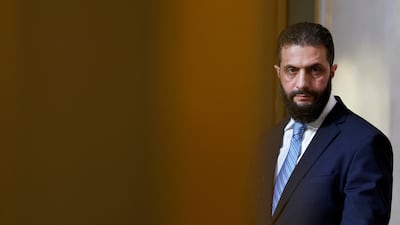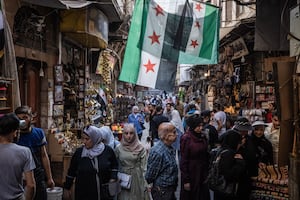The US is preparing to circulate to the UN Security Council a draft resolution calling for the lifting of sanctions on Syria’s leader Ahmad Al Shara.
Discussions are already under way between the Security Council's permanent members – the US, France, UK, China and Russia – to potentially delist Mr Al Shara, his Minister of Interior Anas Khattab and Hayat Tahrir Al Sham (HTS), the group that forms the backbone of the Syrian government, as part of broader efforts to ease economic recovery, sources said.
A UN diplomat told The National that discussions will be “complicated” and require a targeted approach rather than a blanket lifting.
The diplomat also noted that China has expressed reservations, particularly over easing restrictions on certain groups, including foreign fighters.
Maya Ungar, a UN analyst at the International Crisis Group, told The National that Mr Al Shara was initially listed by France and the UK in 2014, while Interior Minister Anas Khattab was designated by the US and HTS was designated as an entity by Syria itself.
Any delisting would require consensus among the Security Council’s 15 members, some of which have previously opposed easing sanctions on Syrian groups.
UN sanctions on HTS and Mr Al Shara are rooted in the group’s deep ties to Al Qaeda and its role in the Syrian civil war.
“In January 2017, Nusra Front created Hayat Tahrir Al Sham as a vehicle to advance its position in the Syrian insurgency and further its own goals as Al Qaeda's affiliate in Syria,” the UN sanctions list states.
HTS traces its origins to Jabhat Al Nusra, or the Nusra Front, which was Al Qaeda’s formal affiliate in Syria and was actively involved in planning, financing and executing attacks on behalf of the global network. In January 2017, Nusra Front rebranded itself as HTS, claiming it was separating from Al Qaeda to better position itself within Syria’s fractured insurgency.
Despite the rebranding, HTS remained under UN Security Council sanctions for its association with Al Qaeda and for “participating in the financing, planning, facilitating, preparing, or perpetrating” acts of terrorism.
“The UN sanctions on Al Shara, Khattab and HTS are strictly related to their involvement with Al Qaeda and ISIS, so discussions about lifting them should just be related to their break from these groups,” said Ms Ungar.
“However, the decision to delist is obviously political and focused on how to ensure that Syria is given a fighting chance to recover," she added.
She noted that the recent suicide explosion at a church in the Syrian capital of Damascus is a “worrying indicator of potential future violence given challenges within the authorities ideological centre”.
Syrian authorities said it was carried out by an ISIS cell.
Ms Ungar said Mr Al Shara and his government have taken tangible steps towards fighting ISIS in Syria, including arresting and publicly executing some members.
Countries such as the US, she explained, have made it clear they are interested in engaging more with the authorities on counterterrorism.
“In order to do so, Al Shara must have the resources and authority to conduct counterterrorism operations,” said Ms Ungar.
The UN sanctions have frozen assets, blocked arms transfers, and imposed travel bans on Syrian leaders and HTS, complicating Syria’s engagement with foreign counterparts. However, there has been some flexibility: the council allowed Mr Al Shara to visit Saudi Arabia in February and Paris in May.
Mr Al Shara is also expected to attend the UN’s annual General Assembly gathering in New York in September.
The%20specs
%3Cp%3E%3Cstrong%3EEngine%3A%20%3C%2Fstrong%3E77kWh%202%20motors%0D%3Cbr%3E%3Cstrong%3EPower%3A%20%3C%2Fstrong%3E178bhp%0D%3Cbr%3E%3Cstrong%3ETorque%3A%20%3C%2Fstrong%3E410Nm%0D%3Cbr%3E%3Cstrong%3ERange%3A%20%3C%2Fstrong%3E402km%0D%3Cbr%3E%3Cstrong%3EPrice%3A%20%3C%2Fstrong%3EDh%2C150%2C000%20(estimate)%0D%3Cbr%3E%3Cstrong%3EOn%20sale%3A%20%3C%2Fstrong%3ETBC%3C%2Fp%3E%0A
Specs
Engine: 51.5kW electric motor
Range: 400km
Power: 134bhp
Torque: 175Nm
Price: From Dh98,800
Available: Now
AWARDS
%3Cp%3E%3Cstrong%3EBest%20Male%20black%20belt%3A%20%3C%2Fstrong%3ELucas%20Protasio%20(BRA)%3Cbr%3E%3Cstrong%3EBest%20female%20black%20belt%3A%20%3C%2Fstrong%3EJulia%20Alves%20(BRA)%3Cbr%3E%3Cstrong%3EBest%20Masters%20black%20belt%3A%3C%2Fstrong%3E%20Igor%20Silva%20(BRA)%3Cbr%3E%3Cstrong%3EBest%20Asian%20Jiu-Jitsu%20Federation%3A%3C%2Fstrong%3E%20Kazakhstan%3Cbr%3E%3Cstrong%3EBest%20Academy%20in%20UAE%3A%20%3C%2Fstrong%3ECommando%20Group%2C%20Abu%20Dhabi%3Cbr%3E%3Cstrong%3EBest%20International%20Academy%3A%3C%2Fstrong%3E%20Commando%20Group%2C%20Abu%20Dhabi%3Cbr%3E%3Cstrong%3EAfrican%20Player%20of%20the%20Year%3A%20%3C%2Fstrong%3EKatiuscia%20Yasmira%20Dias%20(GNB)%3Cbr%3E%3Cstrong%3EOceanian%20Player%20of%20the%20Year%3A%20%3C%2Fstrong%3EAnton%20Minenko%20(AUS)%3Cbr%3E%3Cstrong%3EEuropean%20Player%20of%20the%20Year%3A%3C%2Fstrong%3E%20Rose%20El%20Sharouni%20(NED)%3Cbr%3E%3Cstrong%3ENorth%20and%20Central%20American%20Player%20of%20the%20Year%3A%20%3C%2Fstrong%3EAlexa%20Yanes%20(USA)%3Cbr%3E%3Cstrong%3EAsian%20Player%20of%20the%20Year%3A%20%3C%2Fstrong%3EZayed%20Al%20Katheeri%20(UAE)%3Cbr%3E%3Cstrong%3ERookie%20of%20the%20Year%3A%3C%2Fstrong%3E%20Rui%20Neto%20(BRA)Rui%20Neto%20(BRA)%3C%2Fp%3E%0A
Mercer, the investment consulting arm of US services company Marsh & McLennan, expects its wealth division to at least double its assets under management (AUM) in the Middle East as wealth in the region continues to grow despite economic headwinds, a company official said.
Mercer Wealth, which globally has $160 billion in AUM, plans to boost its AUM in the region to $2-$3bn in the next 2-3 years from the present $1bn, said Yasir AbuShaban, a Dubai-based principal with Mercer Wealth.
“Within the next two to three years, we are looking at reaching $2 to $3 billion as a conservative estimate and we do see an opportunity to do so,” said Mr AbuShaban.
Mercer does not directly make investments, but allocates clients’ money they have discretion to, to professional asset managers. They also provide advice to clients.
“We have buying power. We can negotiate on their (client’s) behalf with asset managers to provide them lower fees than they otherwise would have to get on their own,” he added.
Mercer Wealth’s clients include sovereign wealth funds, family offices, and insurance companies among others.
From its office in Dubai, Mercer also looks after Africa, India and Turkey, where they also see opportunity for growth.
Wealth creation in Middle East and Africa (MEA) grew 8.5 per cent to $8.1 trillion last year from $7.5tn in 2015, higher than last year’s global average of 6 per cent and the second-highest growth in a region after Asia-Pacific which grew 9.9 per cent, according to consultancy Boston Consulting Group (BCG). In the region, where wealth grew just 1.9 per cent in 2015 compared with 2014, a pickup in oil prices has helped in wealth generation.
BCG is forecasting MEA wealth will rise to $12tn by 2021, growing at an annual average of 8 per cent.
Drivers of wealth generation in the region will be split evenly between new wealth creation and growth of performance of existing assets, according to BCG.
Another general trend in the region is clients’ looking for a comprehensive approach to investing, according to Mr AbuShaban.
“Institutional investors or some of the families are seeing a slowdown in the available capital they have to invest and in that sense they are looking at optimizing the way they manage their portfolios and making sure they are not investing haphazardly and different parts of their investment are working together,” said Mr AbuShaban.
Some clients also have a higher appetite for risk, given the low interest-rate environment that does not provide enough yield for some institutional investors. These clients are keen to invest in illiquid assets, such as private equity and infrastructure.
“What we have seen is a desire for higher returns in what has been a low-return environment specifically in various fixed income or bonds,” he said.
“In this environment, we have seen a de facto increase in the risk that clients are taking in things like illiquid investments, private equity investments, infrastructure and private debt, those kind of investments were higher illiquidity results in incrementally higher returns.”
The Abu Dhabi Investment Authority, one of the largest sovereign wealth funds, said in its 2016 report that has gradually increased its exposure in direct private equity and private credit transactions, mainly in Asian markets and especially in China and India. The authority’s private equity department focused on structured equities owing to “their defensive characteristics.”



